How To Build Domain Authority For Your Site in 7 Steps

Domain authority is something that many of us in the digital marketing world care a lot about. Well, not me (I’ll explain later), but most do. The higher you build your domain authority the higher your website can rank in the search engines.
Or at least that’s how it’s supposed to work.
If you’ve never heard about DA until now, well I’m going to explain to you in this article what domain authority is, if it’s important and how to build domain authority fast. Or at least as fast as possible.
Let’s get this party started, and learn first:
What is Domain Authority?
Domain authority, also known as DA, is a metric that is given to a domain name (website address) based on the number and quality of backlinks (links from other websites) that are pointing to that domain name.
Domain authority was first developed by Moz, but now many SEO tools have implemented the same terminology and idea, and in an unofficial way, it became the alternative to the now-defunct Google Pagerank.
Although domain authority is not something that Google uses in their ranking algorithm, it can be used by webmasters, bloggers, digital marketers, SEOs, agencies, squirrels, and pretty much anyone else to get an idea of how well their website or client sites might be performing when it comes to ranking in Google.
Does Domain Authority Matter?
Let’s say you want to create a blog, well, when your blog is finally online, chances are that it will start with low domain authority, usually, it’s 0.
Why?
Because it’s a brand new website, the domain name has no relevant backlinks, and basically, nobody heard about your blog.
The more people and other sites talk and link back to your new website or blog, the higher chances there are to increase your domain authority.
Imagine this example:
You are so amazing with savings and your personal finance that you go out there and decide to create a blog about… “personal finance”.
You start writing blog posts faster than the speed of light, and you’re now waiting for them to rank numero 1 in the SERP (search engine result pages), only that day never came.
How is that possible? You’ve done everything right… what the heck.
Turns out, there are big websites that are 20+ years in the same niche as the one you chose, that have insanely high domain authority 70-90+, and everything they publish gets on the first page, while your website with your puny 1 DA is nowhere to be found.
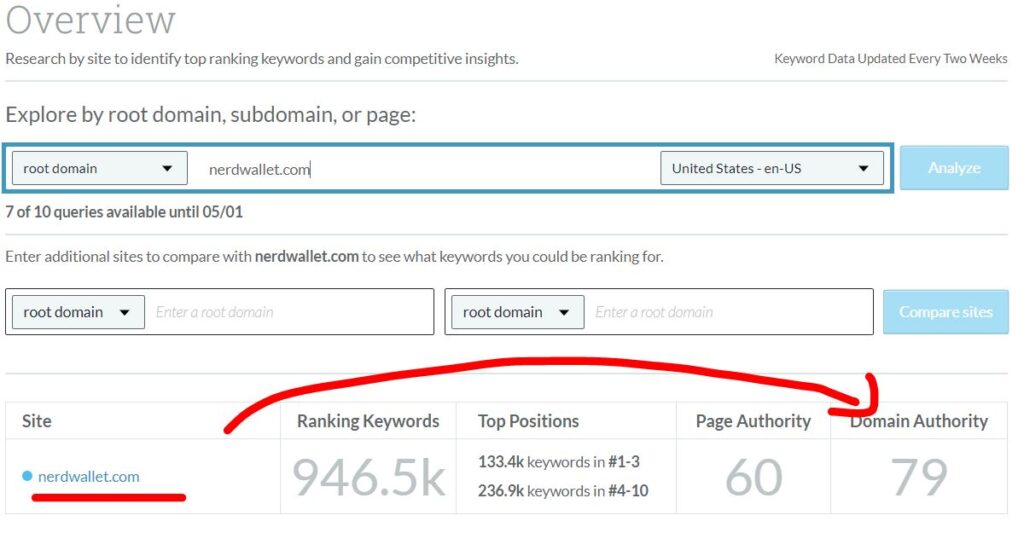
That’s because Google prefers domains with… authority in the industry, the ones that are reliable and have a proven track record that has been putting out quality content for a longer time than you have existed on this planet (probably).
So they do that by checking for a few factors, and one of the most important ones is quality backlinks.
If your site has zero or very few of them, Google is going to naturally prefer a website that has a lot more backlinks and relevant content than yours.
The more backlinks and quality content a website has, the higher the domain authority is going to be.
Domain Authority vs Page Authority
Domain authority [DA] is used to measure the performance and strength of the overall website, while page authority [PA] is used to measure the strength and ranking power of individual pages of your site.
The page authority score or rating is based on the same stuff as the domain authority: backlinks and content.
So if you have written an article about “100 best donut recipes” (are there even 100 donut recipes?, probably), and is not ranking yet, check out the competition and see their page authority of that individual blog post, and see what they are writing and their backlink sources.
A good tool to do that is Semrush (affiliate) because you can easily spy on the competition and check out their top pages, and backlinks.
That’s important because you can then target the websites that are sending links to your competition and ask them to send you some love too (if you have great content).
How is the domain authority score calculated?
Every SEO tool whether it’s Moz, or Semrush will have its own algorithms to calculate domain authority, but in the end, they all base it on two things: relevant content and quality backlinks.
The website then gets a domain authority score that ranges from 1 to 100. The higher the score, the better the authority, with 100 being the best domain authority score and 0 or 1 being the worst.
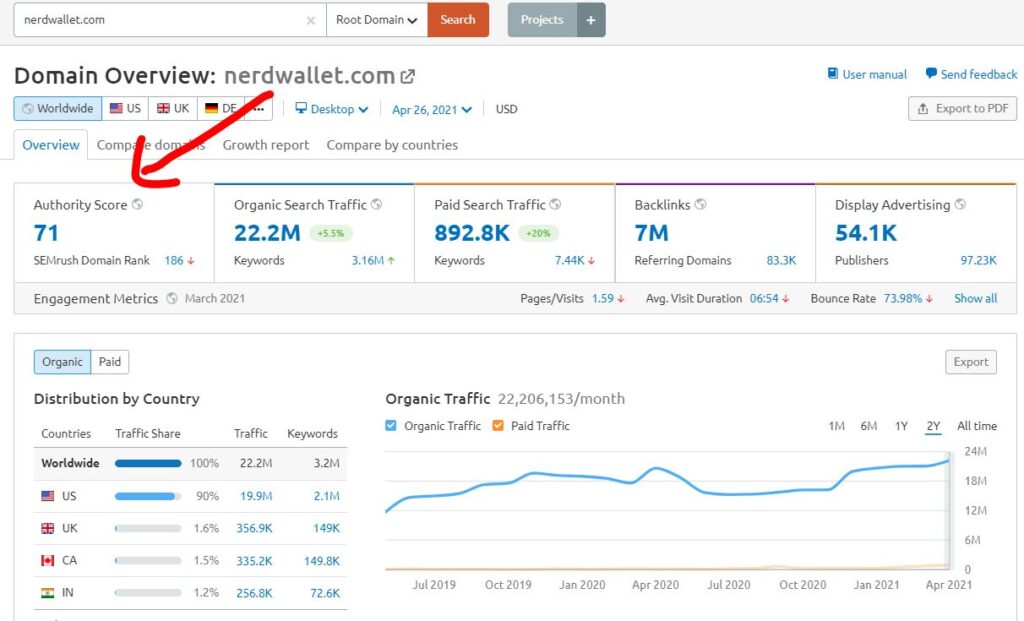
Your aim is to try to get a DA as high as possible if you want to rank for competitive keywords in Google, Bing, and other search engines, to enjoy that sweet flow of free organic traffic.
Why do I keep repeating the word “quality” over and over again? Well just so you know, no, I’m not going insane, or at least I hope not.
The reason why I put so much emphasis on quality, is because well… you don’t want sucky backlinks, meaning backlinks from spam, PBN (private blog network), and in general low-quality websites (adult ones, spammy ones, hacked, etc).
Getting 1,000 backlinks from low-quality sources or from spam is not going to boost your domain authority, in fact, it might actually f*ck it up even more.
How to Check Your Current Domain Authority?

There are a couple of ways to check your domain authority, you can visit Moz Keyword Explorer or download and install their MozBar Chrome Extension.
With Moz, you only have 10 free tries per month though.
You can also see your DA from any other SEO tool that you might be using, such as:
Don’t forget that you can check the website domain authority but also the individual page authority for the important URLs (pages) of your site.
Especially if you have created some amazing pillar content for a competitive niche and want to gain an advantage in the rankings.
If your website is new, don’t expect to have high domain authority, usually, it’s going to be a low number under 30 or so.
But don’t get discouraged, keep on working and publishing blog posts with awesome content and building backlinks and with time you will start increasing your domain authority slowly but surely.
Also, keep in mind that it’s easy to get from a DA score of 10 to 30, but it’s going to get harder the higher the score gets, so from 60 to 70 or from 70 to 80 is going to take years of hard work and again, quality backlinks through great content and outreach.
7 Ways to Improve Your Domain Authority
Alright so now that we went over some of the basics of domain authority, let’s check out some ultra super ninja secret steps to increase it.
1. Create EPIC Content

If you want to build domain authority, the first thing you must focus on is creating EPIC content.
You want to write good and useful articles for users, but by EPIC I mean, the shit has to be so good that Google and other sites out there can’t ignore you.
This is also known as the skyscraper technique, or pillar content, or cornerstone content, it depends on who you ask really.
But the main point stands: you need to write awesome stuff. And not only write, but create videos if you can, design infographics, add stats, do data research etc.
Don’t know how to create any of those? Check out Best Fiverr Gigs, and outsource all of those for around $5.
But how do you get ideas for great content?
Well, you can use a couple of digital marketing tools, first of all, assuming that you have already picked a niche, you should start doing keyword research, and then go and spy what your competition is doing and what they are writing.
One way to do that is by going to Semrush (7 day free trial through my aff. link), and enter the domain name of your competitors (the ones that are ranking high in Google for your topic terms).
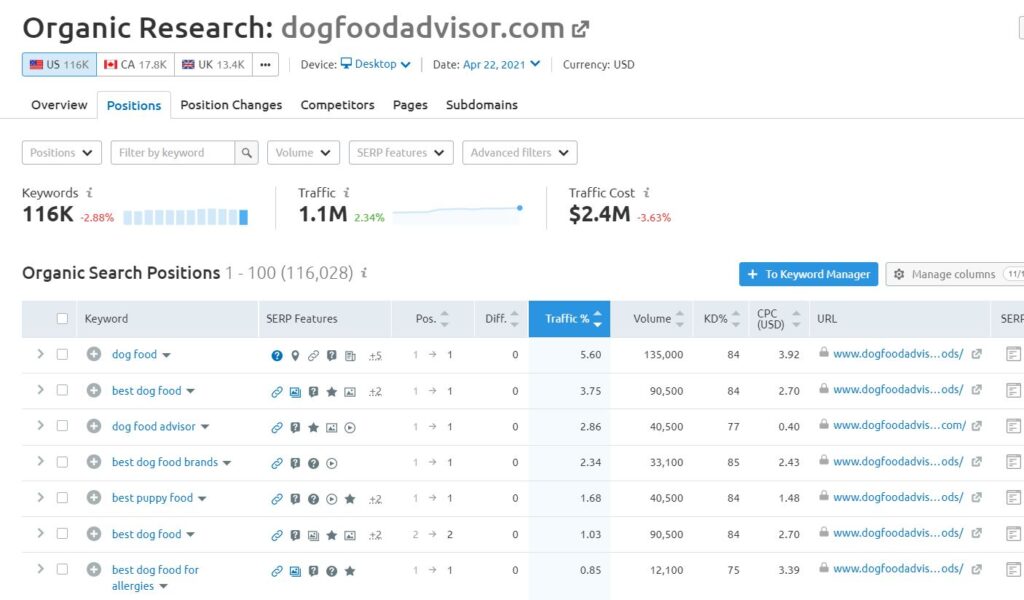
As you can see, if our competitor was “DogFoodAdvisor.com”, by using Semrush we can easily see what their best content is, and on what position and for what keywords they are ranking.
This is huge if you want to go after certain websites and try to outdo them with better content. You won’t need to think too much at topic ideas, and what articles to write, since you clearly have a list of winner ideas that have worked for others.
You can also use Answer the Public to get even more in-depth content ideas based on terms from your topics.
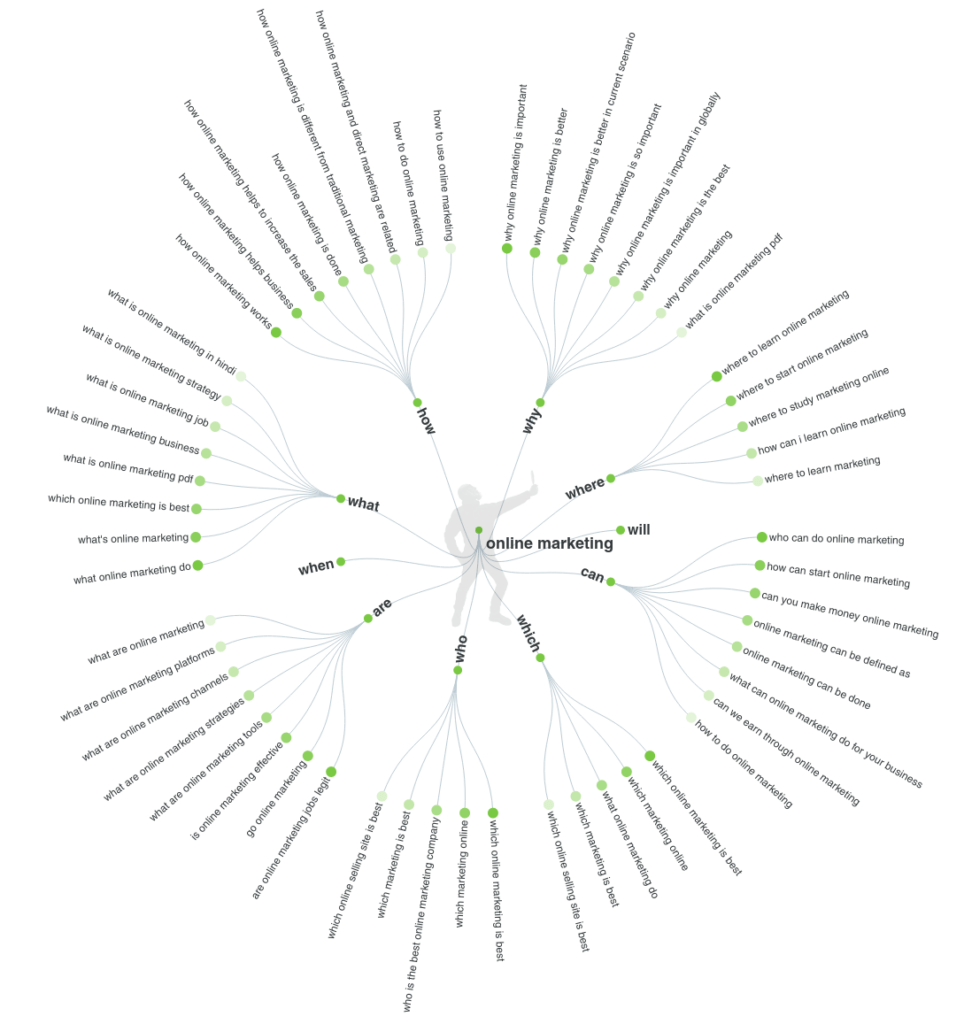
Not that many marketers know about Answer the Public, which is good for me and you (less competition) since we can use this awesome tool to learn exactly what people are looking for and searching and what type of content to create.
2. Build Quality Backlinks
Here we go again with this quality backlinks spiel.
Listen, I’m not here to convince you how to build your backlinks, you can do whatever you want, heck you can even go and spam as many forums and blogs as you can.
But if you want to build domain authority and not get slapped in the face with a brick by Google, then you should try and only attract value links to your site.
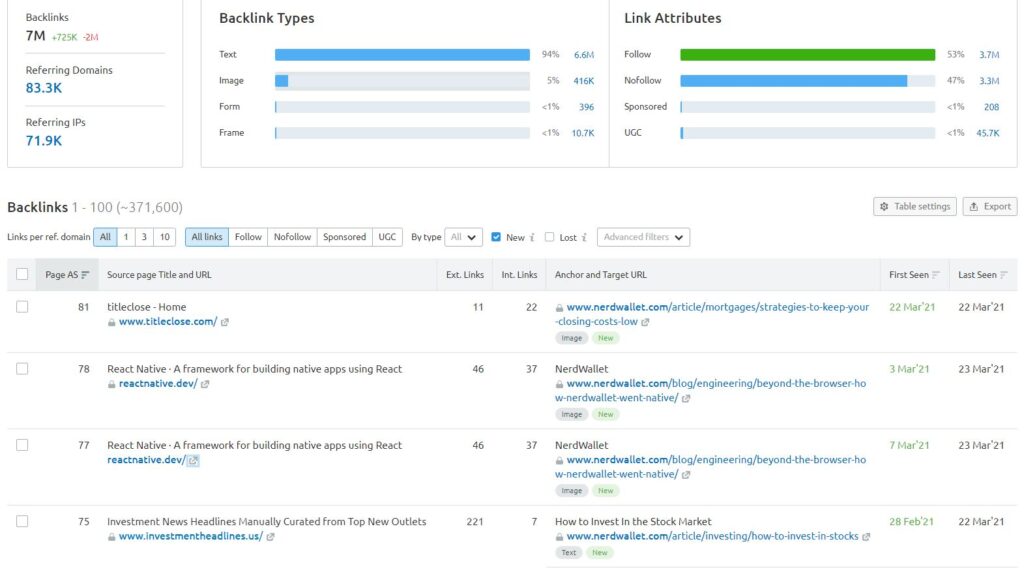
Here’s how you do that:
- Analyze your competition and check where their backlinks are coming from.
- Contact the websites that link to your competition and ask them to link to your site too, especially if you wrote a much more quality piece of content.
- Write guest posts (again see if your competition has written guest posts) and go out there and do it as well. Obviously, the guest posts should be on good sites that have higher domain authority than yours.
- Create epic content that can get shared a lot and attract backlinks naturally (videos, infographics, stats, case study, in-depth articles)
- Sit back and wait for the backlinks to take effect.
Related: Should You Buy Backlinks for SEO?
3. Do on-page SEO

While building backlinks is a lengthy and ongoing process, on-page SEO is easier to do and manage.
Time and time again Google tells us that they value high quality and useful website content, probably even more so than backlinks, so you want to make sure that your website and your content are optimized.
Here are some things that you should do before you hit publish on a new post:
- Do keyword research, and come up with a great focus keyword.
- Craft an awesome headline (using the main keyword in the title tag)
- Use the focus keyword as a URL slug.
- Use headings properly throughout your content (H1, H2, H3, H4, H5)
- Always place internal links for other articles on your site in all your content
- Use the main keyword inside the first paragraph and meta description
- Also, use related keywords throughout your content (but don’t overdo it)
- Add images and make sure to add the alt text (with related keywords)
4. Improve Your Page Speed

In the words of Jeremy Clarkson: SPEEEEEEEEEEEEEEEEEEEED.
No, but seriously, you want to make sure your website and individual articles page speed is in the green range.
A short website loading time not only is super important for users (many will leave your website if it’s not loading in under 3 seconds), but it’s also officially a ranking algorithm for Google.
And with the upcoming Google core update, they have made page speed more important than ever.
How do you improve your website speed? Well there are a few tricks:
- Use good and clean WordPress themes without too many bloating features
- Install fewer plugins (and uninstalling the ones you don’t really need)
- Optimizing your images, and serving them through next-gen formats like .webp
- Upgrade your hosting from shared to cloud VPS – Get $100 to try out Vultr VPS
- Obviously, your website should be responsive and mobile-optimized
- Don’t use fancy fonts that slow down your website (disable google fonts)
- Remove font-awesome and other icon libraries
There’s more stuff to be said and checked when it comes to optimizing your website for speed, but I feel like those are the main important ones.
5. Boost Your Social Signals

It’s been known that Google and Bing and pretty much all other search engines, are looking to see if your website gets any social mentioning or social signals.
The more your content gets shared, the higher you grow in Google’s eyes 😍
Really, it’s that simple.
So how do you achieve that? Well, go back and look at step #1 (create epic content).
You could also take a shortcut though, by examining what content gets shared a lot in your niche by using tools like Buzzsumo or, you’ve guessed it Semrush.
Semrush has 40+ tools that you can use to grow your blog and online business, and nothing on the web compares to that.
Go get yourself a 7-Day Free Trial through my affiliate link, and see how good it is.
Looking for something more budget-friendly? (but with fewer features), check out Mangools.
That way you know for sure what and how to write your content to attract the most shares possible.
Also, there isn’t just Facebook, Instagram, Twitter, and Pinterest out there. Check out other social networks such as Reddit (learn how to do marketing on Reddit)
6. Remove Bad Backlinks
If you’ve done the stupid thing of spamming websites and blogs hoping to increase domain authority, you can create a disavow file to let Google know that you’ve been a naughty boy or girl, but now you’re good.
You will have to be absolutely sure that the links you want to disavow are bad, so if you see some fishy or spammy links in your Google Search Console or in your favorite backlink checker, then you can “tell” Google to ignore them, by uploading a disavow file.
Again make sure you got the correct bad links, otherwise, you’re going to screw up your rankings, and domain authority.
When webmasters are desperate o build domain authority they sometimes go dark and try doing shady stuff like using PBNs (private blog networks), backlink spamming on blogs and forums, and .edu and .gov and Wikipedia sites, etc.
Sometimes it happens that your website get’s targeted by competition that has malicious thoughts to defeat you and so they engage in blackhat backlinking techniques like the ones I’ve explained above to get your website penalized.
Yeah, that sometimes happens, it sucks but such is life.
7. Check for Crawlability Issues
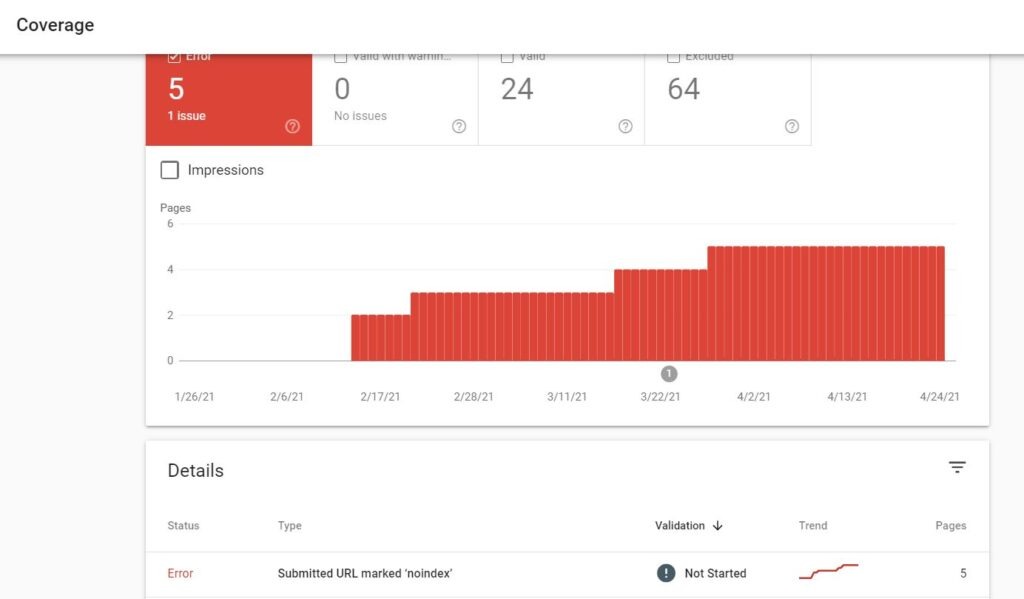
Sometimes it’s possible that some of your pages won’t be crawled and indexed into Google.
This can be either due to technical issues (server problems, bad SEO practices, or using an SEO plugin the wrong way).
Other times, it simply happens that you’ve posted too much content and Google needs to take some chill time but will eventually get to crawling and indexing your content if nothing is stopping them.
If you have a robots.txt file, make sure you don’t block Google’s bot crawlers. Also don’t “no-index” pages that you want to rank for, only use that tag for pages that you want to hide from the SERP (like thank you pages, etc).
Can a Website Rank Without High Domain Authority?
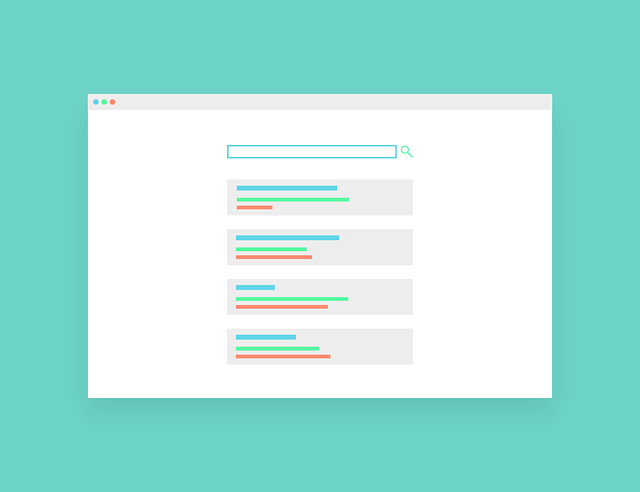
The truth is that you can absolutely rank on the first page of Google without having high domain authority.
But…
It’s not going to be after insanely competitive keywords like “best credit cards”.
You will have to go on the hunt and research topics and terms and long-tail keywords that have minimal or zero competition, and write content for those.
That’s why I never really cared about domain authority, because I went for low competition keywords on all my niche sites (at first), to get some traffic started until I build up my authority.
And if you know me, you know that I hate building backlinks and even doing SEO, and I rely more on cheap website traffic, but that doesn’t mean I don’t care about SEO and not optimize my sites and articles for it.
So in the beginning, focus on writing epic shit, on low competition keywords that are related to your topic or niche, and with time, as more and more of your articles will be ranked on the first page. you will start gaining backlinks naturally.
Oh and structure your content in such a way that you increase the chances to get featured snippets. This can be a massive traffic boost, especially for new sites.
Increasing Domain Authority: Conclusion
Improving domain authority is something that most webmasters and marketers should strive to do, especially at the beginning when their site is fresh.
Sure, DA is not the most accurate metric in the world, but it’s still widely agreed that a high domain rating equals better rankings.
So if you want to rank for highly competitive keywords, you better have a DA that’s similar to your competition.
Share the article, with your dogs, squirrels, cats and human friends. Remember what I said earlier about social signals 😉 This shit matters yo.
Until next time, stay hustlin’
Stephen



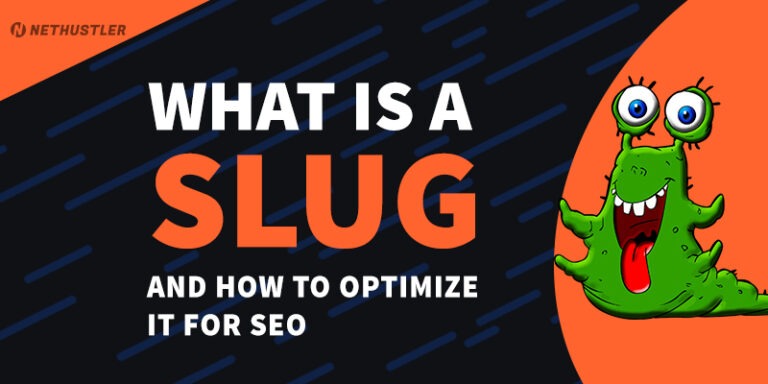


Too much of everything isn’t always good. What I’ve seen many online publishers commit to is develop thousands of backlinks from wherever possible in hopes of increasing their DA. A lot of backlinks include spammy links. Every website gets bombarded by a hurricane of spam backlinks and a good publisher always cleans up their toxic backlinks now and then. Don’t wait to be penalized by a new algorithm and inculcate the habit of cleaning backlink spam once or twice a month.
Low quality backlinks are also a setback for domain authority. It only reduces the quality of the link due to the lack of fit and the low quality back link. But many marketers just opt for the strategy of creating millions of links so that they can stand out in search engines. In order to improve website ranking, backlink strategies are being abused. It directly affects the domain authority of the site….
Yep, that’s exactly the essence of the article. Just create great content and backlinks will come naturally. If you do decide to go the gray/black hat route, don’t buy crappy services and links for $5, invest in high quality guest posts on reputable and trusted sites such as Forbes, Entrepreneur, etc.
Another great article Stephen! Over the past year or so of our own journey.. We’ve came to the conclusion that… 1. On page SEO. 2. Topical authority. 3. Domain authority. ARE the best goals to aspire to. Love your content as always, keep up the good stuff my friend!
Indeed, it seems that topical authority is going to be key in 2023, of course, links are also good but yeah, I’ve seen it myself while ranking a 0 DA website from 1k clicks per month in February to almost 10k clicks per day today. All because of topical authority 🙂
Wow, thanks so much for this insights. I do have a question though.
Some people say having a higher DR is more beneficial that have a higher DA.
What are your thoughts?
Because, I feel both are just one of the factors being used to rank in the SERPs, but I will love to have your input though.
Hi there,
They are both essentially the same thing. Ahrefs uses DR, and MOZ uses DA. Both services use their own algorithms to determine the score. But also those can mean jack sh*t, I’ve had sites ranking first position with 0 DA/DR, so it’s not always a great ranking factor. But overall yeah, having a high DR or DA is helpful, as it means that the site has some healthy backlinks profile, etc.